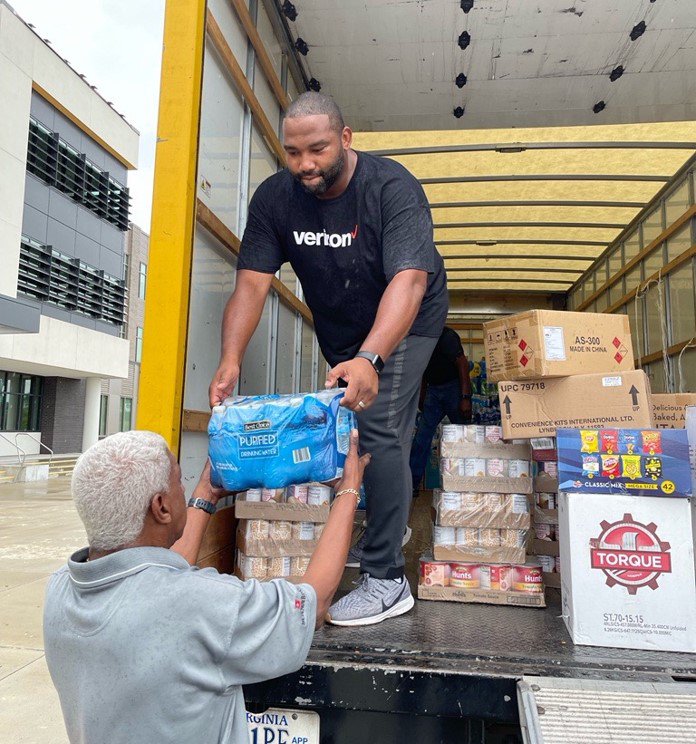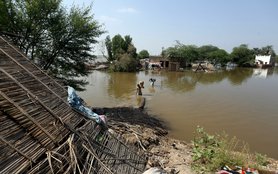[ PART OF A SERIES ON OUR CHANGING CLIMATE ] | A firsthand look at what it's like in Louisiana in the wake of Hurricane Ida.
Since Hurricane Ida made landfall on August 29, Gulf Coast residents have been facing one challenge after another. Hundreds of thousands were without power for many days, a water crisis loomed large, and countless buildings were damaged or destroyed. The heat wave that followed delivered searing temperatures, and power outages meant no relief. We may never know the death toll from the climate double disaster.
Telley Madina, former Oxfam staff in Louisiana, checked in with us shortly after the storm hit. He and his family sought shelter in Baton Rouge, but after the storm he travelled back and forth to New Orleans, and kept tabs on his communities.
We spoke to him last week, when the power grid had yet to be restored, and people were facing myriad problems from loss of power.
Really, Ida’s timing could not have been worse. People have been stuck in their houses in 100 degree heat, with no air conditioning and no refrigeration. They can’t store food or medicine. Those who are lucky enough to have a generator have to find fuel for it. Some folks, worried about theft, bring the generator inside, and we’re seeing carbon monoxide poisoning.
Of course, we all know it happened on the anniversary of Katrina; so many of us are still dealing with the long-term impacts of that climate disaster. But it also reminds me of the first days of COVID. The streets are just eerie, with the lights out and nearly all the businesses closed. It’s like a ghost town. The mayor implemented a curfew after dark, since everything is shut down, including street and traffic lights.
The only businesses that stayed open are the most essential: gas stations, grocery stores, hospitals. And they’re all struggling. People are waiting in line for gas, sometimes for hours—so long that they end up running out of gas. Tensions are running high, and you hear of fights breaking out. And grocery stores are running out of food. I managed to store tanks of gas at friends’ houses, so I could travel around the state safely.
Hospitals are mostly managing on generators, but we had terrible incidents of elderly people suffering and dying in nursing homes and “independent living” situations, and even during evacuations. It just makes you realize how vulnerable some folks are when the power fails, especially the elderly and people in wheelchairs.
All these disruptions in the system can have a snowball effect. We just lost a friend, a 48-year-old woman who’d been successfully managing her diabetes for years. When the storm hit and she lost electricity, her house heated up so much she passed out. Rather than call 911 (emergency services have also been impacted so much you can wait for hours), her husband got her into the car and headed for the hospital. Another car barreled through the intersection (no traffic lights), and after the accident and the waiting, she eventually suffered brain damage and passed away.
And of course all the schools are closed, so my kids are just hanging around—after what was already a rough beginning due to COVID. Hardly anyone has COVID as their first priority now, so I worry about what we’ll see a few weeks from now.
New Orleans didn’t even see the worst of it. In many of the coastal parishes, people saw the kind of flooding that sent them to their attics and roofs, and they’re still without drinking water. I’m glad we invested billions in the levee system in the city, but there are so many people who are still vulnerable to flooding and high winds.
The storm ramped up so suddenly and became a monster so fast that we didn’t have time to evacuate. (See this blog on the weather patterns that led to Ida’s strength.) But really, evacuation would have been a nightmare; as it was, it took a friend six and a half hours to drive from New Orleans to Biloxi that day (where it normally takes about an hour).
You know, we’re resilient here. We’ve lived through hurricanes and massive cleanups for as long as I’ve been around. But to have another giant hurricane on the anniversary of Katrina tells us Katrina wasn’t a fluke—it’s our future. It’s exhausting to think about. I worry for my communities, who are already dealing with COVID and the impacts it’s had on our economy, our families, our health.
There are more climate disasters like this on the horizon, and one way or another, we are all living in harm’s way. We need a plan not just to invest in infrastructure, but to reduce the devastating impact of powerful storms on the people who live in their path.

Hurricane Ida left a trail of destruction, with harshest impacts on vulnerable communities. Oxfam partners with several organizations in Mississippi and Louisiana that have mounted robust emergency response efforts. Join us in supporting them:
- Foundation for Louisiana and Urban League of Louisiana have partnered on the Black Business Works Fund to help Black-owned businesses stand back up in the aftermath of the storm.
- The Power Coalition is raising and granting money to base-building organizations throughout Louisiana.


